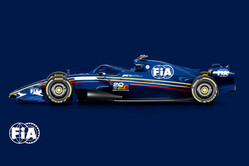


07/06/2024
NEWS STORY
 Like the rest of us, the look (and weight) of F1 2026 has left a number of drivers feeling distinctly underwhelmed.
Like the rest of us, the look (and weight) of F1 2026 has left a number of drivers feeling distinctly underwhelmed.
Out goes DRS but in comes another gimmick, manual override mode, which, along with a reduction in width, weight and various other things is supposed to make overtaking easier... which is exactly what was promised with the 2022 overhaul.
Indeed, in the wake of yesterday's news from F1 and the FIA, one Pitpass reader appeared to sum it up perfectly.
"This feels like asking your kid to mow the front yard and after a good while they come in all exhausted and proud only to later find out they've only just done the edges. Leaving you to question just what in the hell were they doing all morning," commented Celtic Tiger.
Max Verstappen is similarly unimpressed.
To be honest, I'm now a bit in the middle," the Dutchman told Motorsport.com. "The new rules are what they are and I think they mainly have to do with the engine regulations. They realised that active aerodynamics was necessary to reduce air resistance to achieve a decent lap. Otherwise, at some point you will no longer have any power from the battery, and they discovered that themselves."
The three-time world champion had previously revealed that in simulator tests the proposed 226 cars had seen him going down the gears at Monza, however this has now been 'solved' by means of an 'X-mode' that will give drivers a top-speed boost when needed.
"Now they have changed the way you use the energy a bit on straights," added Verstappen. "As a result, I think we no longer have to downshift on straights, although the curve with which you achieve the speed is slightly different.
"I think everyone needs more simulations to get a good understanding," he continued. "The active aerodynamics is mainly needed to tackle the problem on straights. If they arrange that well, then it will be the same for everyone."
As for the manual override mode, which gives a pursuing car an energy boost from the MGU-K, and 'replaces' DRS, Verstappen likened it to "banana peels" in Mario Kart.
Asked if it will make the racing too artificial or complicated, he said: "Let's hope not, let me put it this way. I personally hope it doesn't. It is still a bit of a work in progress and we need more simulations.
"We will see what it turns out to be, I get in the car and think 'oh, this feels great', but I don't know. That's why I'm a bit neutral now. Ultimately, we have to drive with what we get."
Seven-time world champion, Lewis Hamilton is more concerned by weight.
"It's only 30 kilos," he said of the planned reduction, "so it's going in the right direction but it's still heavy.
"I mean I've only just seen what you've all seen this morning," he added. "I don't really have huge thoughts on it just yet, I spoke to some drivers who have driven it on sim as I haven't driven it on the sim, they said it's pretty slow. So we will see whether it's actually the right direction or not."
Two-time champion, Fernando Alonso was even more forthright.
"I think it is impossible probably to achieve 30 kilos already," said the Spaniard. "If the power unit is 50% electric and you need the batteries to support that, cars will just increase 20 or 30 kilos because of the power unit. And then you want to reduce 30 kg... you'll need to drop 60 kilos of the current car, which is the same as at the moment, probably to the teams it's an impossible target.
"They have two years to achieve that target and as always in Formula 1, what is impossible in 2024 will become reality in 2026 because there are very clever people in the teams. But I think all is a consequence of something else that is in the cars."
"I don't want to speak out of turn, but it's going to be very slow, extremely slow," warned Alex Albon. "I'm guessing there's a lot of stuff being done around making sure the straight-line speeds are not tapering off at the end with all of the MGU-K and whatnot being involved.
"I still think there needs to be some work done," he admitted. "Seeing the speed traces around some of the tracks... it's pretty slow.
"The size of the cars, I think is the right direction," he added. "Obviously, it seems to be that to recover what these new engine regulations are creating, everything becomes extremely complicated. I'd rather just have a bit more simple engines."
Asked about Alonso's comment, Verstappen admitted: "As it seems at the moment, that will be very difficult. Some teams already have a car that is too heavy, so it is above the minimum weight.
"I know the cars are getting a little smaller, but if teams reach that 30 kilos, then we are really talking about the perfect scenario of what is possible.
"The cars should actually become one hundred to one hundred and fifty kilos lighter," he added, referring to Hamilton's claim. "It is absolutely not possible with the way things are now. That mainly has to do with the engine.
"The battery is currently very large, both long and wide, which makes something like that wishful thinking. We actually need such a weight saving to make the cars more agile and a bit more fun.
"Safety has also added a lot of weight, although I am convinced that it can be done differently. It just depends on how you write the regulations."